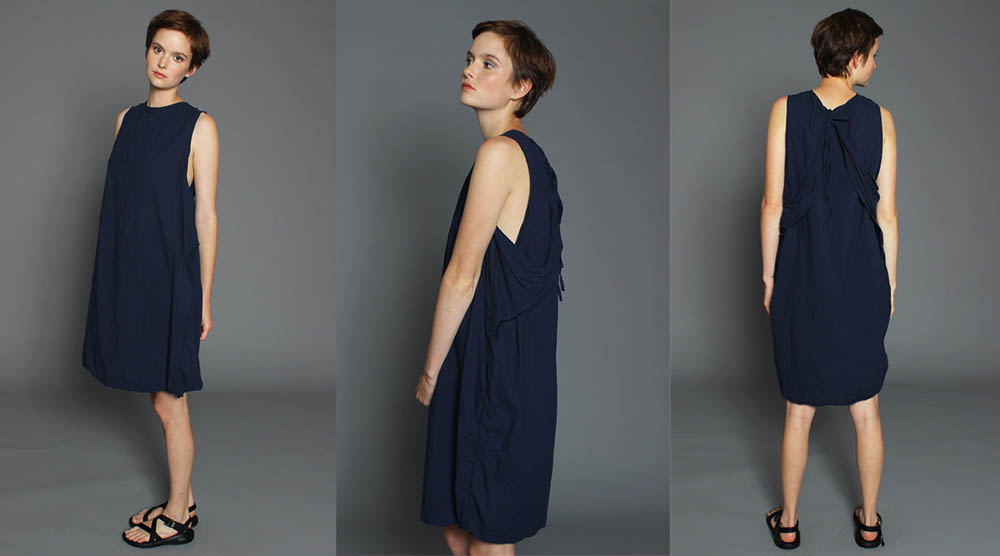Creaky stairs lead up to the second floor of a narrow brick building in Sunset Park, where the Brooklyn fashion brand UZI NYC occupies a headquarters at odds with the brand’s expanding reputation. UZI’s founders, Mari Gustafson and Dave Ball, have managed to cram four employees, eleven sewing machines, silkscreens, hundreds of yards of fabric and one calico cat in a bit less than 1,000 sq. ft. The space is so tight that they store much of their excess fabric in warehouse three blocks away.
“We’ve always been on the boundaries of coolness,” Gustafson said, explaining how the company has been forced to move every few years because of rent hikes. She started UZI with Ball, a high-school friend, in 1993, when the pair was living in Denver. In 1999, following a New Year’s resolution to move to New York, the two opened a small production space in the East Village. At the time, UZI produced “cute kitschy punk-rock clothes,” according to Gustafson.
The Stone Now Dress, part of the spring collection, sells for $129 (Photo Credit: Veronica Ibbara)
But these days UZI, which stands for the Underground Zeitgeist of Iconoclasm, is capitalizing on a Brooklyn aesthetic that’s a long way from East Village punk. “We completely changed what we manufacture,” Gustafson said.
Gustafson manages the business, while Ball produces the designs. The two of them came up with a line of “urban nomad clothing” inspired by the constant moving and long bike rides that characterized their lives a few years back. “We wanted designs that were interesting but functional, worn in a lot of different ways,” Gustafson said. “And loose. Because summertime in New York City is hot as hell.”
Mari Gustafson in UZI’s combined office and factory in Sunset Park (Photo credit: Emily Nonko)
The loose but chic aesthetic caught the interest of Anthropologie last fall; the 225-store retailer eventually bought several designs to sell online as part of its spring catalog. Anthropologie decided to name each one after a Brooklyn neighborhood: the Ditmas and Gowanus V-neck tunics, the Park Slope printed tunic, and the Carroll tunic. Gustafson is admittedly surprised that a multinational corporation would find inspiration in South Brooklyn for marketing the clothing line. “Increasingly, the South Brooklyn frontier has become hip,” she said. “It’s kind of ridiculous for a toxic waste site.”
But she’s also aware of the selling power of UZI’s roots at a time when the Brooklyn brand has never been more popular. “This is made in Brooklyn and sold in Brooklyn–this is a very Brooklyn product,” Gustafson said. “Anthropologie knows that the Brooklyn brand sells.” The dresses moved briskly after launching in January, but a limited stock can still be found through Anthropologie’s website.
The Journey to Sunset Park
UZI’s Brooklyn cred happened a bit by forces beyond its control. Gustafson and Ball are no strangers to rent hikes, which displaced them from Manhattan to North Brooklyn to Sunset Park. “We never thought ‘Let’s go to Brooklyn,’” Gustafson said. “Just to save on rent, and exist, we moved to Brooklyn. We didn’t realize [the Brooklyn brand] would happen.” The team spent a difficult three years in 2010-12 transitioning from punk clothes to their current line; to make ends meet Gustafson lived in the Sunset Park production space for two years. (She now lives in a studio in Bay Ridge.)
The Triangle Dress goes for $198 (Photo credit: Veronica Ibbara)
The pair also discovered a burgeoning manufacturing district in Sunset Park, with access to a workforce of talented sewers and warehouses lining the blocks around the waterfront. “We accidentally stumbled into this emerging garment district,” says Gustafson. More than 100 garment manufacturers now operate in the neighborhood. City government has caught on too. In February, city officials announced a push to establish a modern garment district within the area. Brooklyn Army Terminal, the massive mixed-use development close to UZI’s production space, plans to open 500,000 sq. ft. of new manufacturing space this fall.
Gustafson and Ball realized their own vision might be sustainable in 2012, when they sold several designs to Madewell, a fashion division of J. Crew that operates 110 stores. As UZI’s reputation grew, so did its prices. “We doubled the price of everything and found a new customer,” as Gustafson put it. The Gowanus dress was marketed by Anthropologie for $188. By adapting to a changing, wealthier Brooklyn, a place where a $188 dress isn’t out of the question, “we’re more successful than we ever were,” Gustafson said.
At the same time, UZI took advantage of the arrival of upscale clothing boutiques to the borough and now sells at five boutiques around North Brooklyn: Alter Brooklyn in Greenpoint and Williamsburg; Kaight in Boerum Hill; ONA in Prospect Heights; Bhoomki in Park Slope; and Jill Lindsey in Fort Greene. The company sells to 40 other shops around the country and has a Japanese distributor. Customers can also buy directly through UZI’s website.
Even with its expanding presence around the world, UZI keeps its foothold among Brooklynites, offering tours of its Sunset Park space by appointment. “Much of our actual business is here in Brooklyn,” Gustafson said. “You can eat locally, you can also dress locally. You have that option.”
